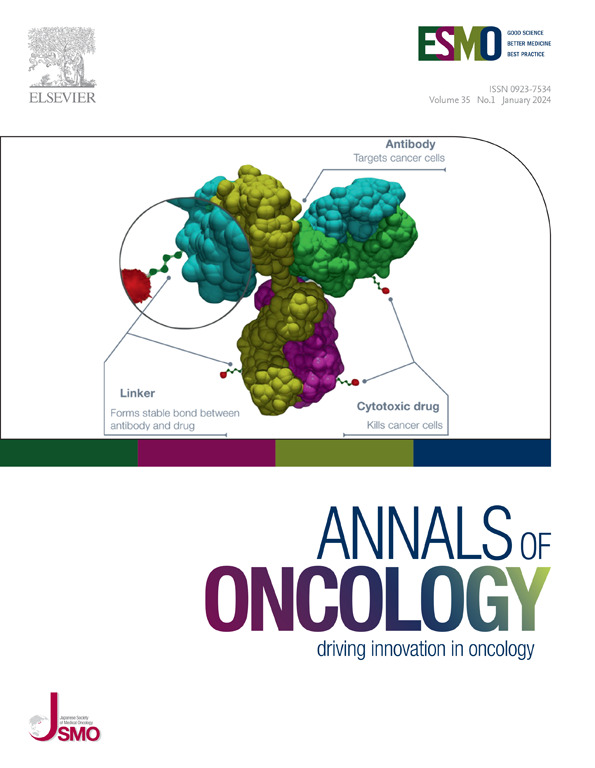The efficacy and safety of mirvetuximab soravtansine in FRα-positive, third-line and later, recurrent platinum-sensitive ovarian cancer: the single-arm phase II PICCOLO trial
IF 56.7
1区 医学
Q1 ONCOLOGY
引用次数: 0
Abstract
Background
Mirvetuximab soravtansine-gynx (MIRV) is a first-in-class, folate receptor alpha (FRα)-targeting antibody–drug conjugate with United States Food and Drug Administration approval for FRα-positive platinum-resistant ovarian cancer. PICCOLO is a phase II, global, open-label, single-arm trial of MIRV as third-line or greater (≥3L) treatment in patients with FRα-positive (≥75% of cells with ≥2+ staining intensity) recurrent platinum-sensitive ovarian cancer (PSOC).
Patients and methods
Participants received MIRV (6 mg/kg adjusted ideal body weight every 3 weeks) until progressive disease (PD), unacceptable toxicity, withdrawal of consent, or death. Primary endpoint was investigator-assessed objective response rate (ORR). Key secondary endpoint was investigator-assessed duration of response (DOR). Additional endpoints included investigator-assessed progression-free survival (PFS), overall survival (OS), and safety. Analyses of subgroups by disease characteristics (e.g. platinum-free interval) and treatment history [e.g. prior bevacizumab and poly (adenosine diphosphate [ADP]-ribose) polymerase inhibitor (PARPi) treatment] were exploratory.
Results
Seventy-nine participants were enrolled and efficacy assessable. The primary endpoint was met; ORR was 51.9% [95% confidence interval (CI) 40.4% to 63.3%]. Median DOR was 8.25 months (95% CI 5.55-10.78 months) and median PFS was 6.93 months (95% CI 5.85-9.59 months). OS was not mature at data cut-off. ORR was 45.8% (95% CI 32.7% to 59.2%) in participants with PD while on/within 30 days of prior PARPi (n = 59) and 60.0% (95% CI 14.7% to 94.7%) in those without PD with prior PARPi (n = 5). No new safety signals occurred; most common treatment-emergent adverse events (TEAEs) were gastrointestinal, neurosensory, and resolvable ocular events. TEAEs led to discontinuation in 13 participants (16%) and death in 2 participants (3%).
Conclusions
MIRV as ≥3L treatment in heavily pretreated recurrent FRα-positive PSOC demonstrated notable efficacy and tolerable safety, including among those with prior PD on or within 30 days of PARPi (NCT05041257).
Mirvetuximab Soravtansine治疗fr α-阳性、三线及晚期复发铂敏感卵巢癌的疗效和安全性:单臂2期PICCOLO试验
Mirvetuximab soravtansine- gyynx (MIRV)是一种一流的叶酸受体α (FRα)靶向抗体-药物偶联物,已获美国食品和药物管理局批准用于FRα阳性铂耐药卵巢癌。PICCOLO是一项全球2期、开放标签、单臂试验,MIRV作为三线或更高(≥3L)治疗fr α阳性(≥75%的细胞≥2+染色强度)复发性铂敏感卵巢癌(PSOC)患者。患者和方法:参与者接受MIRV治疗(每3周调整6 mg/kg理想体重),直到疾病进展(PD)、不可接受的毒性、撤回同意或死亡。主要终点是研究者评估的客观缓解率(ORR)。关键次要终点是研究者评估的反应持续时间(DOR)。其他终点包括研究者评估的无进展生存期(PFS)、总生存期(OS)和安全性。根据疾病特征(如无铂期)和治疗史(如既往贝伐单抗和聚[adp -核糖]聚合酶抑制剂[PARPi]治疗)对亚组进行探索性分析。结果:79名参与者入组,疗效可评估。主要终点达到;ORR为51.9% (95% CI, 40.4-63.3)。中位DOR为8.25个月(95% CI, 5.55-10.78),中位PFS为6.93个月(95% CI, 5.85-9.59)。OS在数据截断方面还不成熟。PD患者在PARPi发生后30天内(n=59)的ORR为45.8% (95% CI, 32.7-59.2),无PD且PARPi发生后30天内(n=5)的ORR为60.0% (95% CI, 14.7-94.7)。没有出现新的安全信号;最常见的治疗不良事件(teae)是胃肠道、神经感觉和可解决的眼部事件。teae导致13名参与者(16%)停药,2名参与者(3%)死亡。结论:MIRV≥3L治疗重度预处理复发性fr α阳性PSOC表现出显著的疗效和可耐受的安全性,包括在PARPi治疗时或30天内患有PD的患者。(Funding, ImmunoGen, Inc;NCT05041257)。
本文章由计算机程序翻译,如有差异,请以英文原文为准。
求助全文
约1分钟内获得全文
求助全文
来源期刊

Annals of Oncology
医学-肿瘤学
CiteScore
63.90
自引率
1.00%
发文量
3712
审稿时长
2-3 weeks
期刊介绍:
Annals of Oncology, the official journal of the European Society for Medical Oncology and the Japanese Society of Medical Oncology, offers rapid and efficient peer-reviewed publications on innovative cancer treatments and translational research in oncology and precision medicine.
The journal primarily focuses on areas such as systemic anticancer therapy, with a specific emphasis on molecular targeted agents and new immune therapies. We also welcome randomized trials, including negative results, as well as top-level guidelines. Additionally, we encourage submissions in emerging fields that are crucial to personalized medicine, such as molecular pathology, bioinformatics, modern statistics, and biotechnologies. Manuscripts related to radiotherapy, surgery, and pediatrics will be considered if they demonstrate a clear interaction with any of the aforementioned fields or if they present groundbreaking findings.
Our international editorial board comprises renowned experts who are leaders in their respective fields. Through Annals of Oncology, we strive to provide the most effective communication on the dynamic and ever-evolving global oncology landscape.
 求助内容:
求助内容: 应助结果提醒方式:
应助结果提醒方式:


